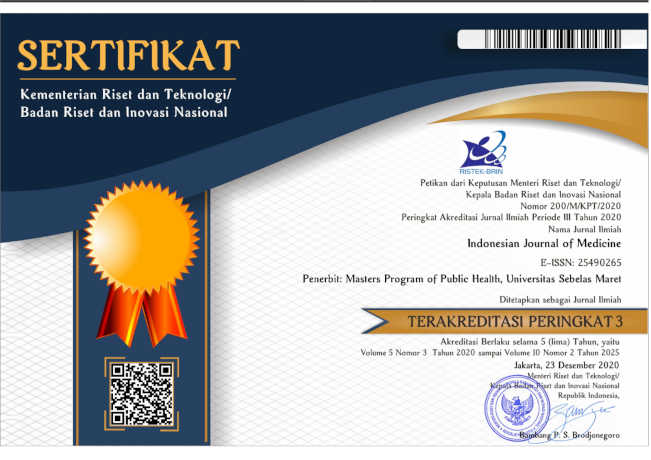The Relationship between Tumor Size and Carcinoembryonic Antigen (CEA) Levels in Stage IV Colorectal Adenocarcinoma Patients at Dr. Moewardi Hospital, Indonesia
DOI:
https://doi.org/10.26911/theijmed.2021.6.3.419Abstract
Background: Colorectal adenocarcinoma is one of the most common types of colorectal cancer based on histopathology, accounting for about 10% of cancer cases diagnosed worldwide each year. Tumor size and levels of carcinoembryonic antigen (CEA) are used to determine the presence and evaluation of colorectal cancer. However, studies on the correlation between the size of colorectal cancer based on CT scan abdominal with contrast and the CEA levels are still very minimal in the Indonesian population. This study aimed to analyze the relationship between tumor size examined by abdominal CT scan with contrast and carcinoembryonic antigen (CEA) levels in stage IV colorectal adenocarcinoma patients.
Subjects and Method: A cross-sectional study was conducted at the radiology department, Dr. Moewardi hospital, Surakarta, from February 2021 to July 2021. A total of 40 patients with stage IV colorectal adenocarcinoma were selected in this study. The patient already had the examination results of blood CEA levels and performed an abdominal CT scan with contrast. The dependent variable was blood CEA levels. The independent variable was tumor size. Data were collected from medical records and analyzed by the Spearman test.
Results: There was a positive and significant relationship between tumor size and CEA levels (r= 0.47; p= 0.003).
Conclusion: Tumor size is positively correlated to blood CEA levels in patients with stage IV colorectal adenocarcinoma.
Keywords: colorectal adenocarcinoma, contrast abdominal CT scan, carcinoembryonic antigen (CEA).
Correspondence: Sulistyani Kusumaningrum. Department of Radiology Dr. Moewardi Hospital/ Faculty of Medicine of Universitas Sebelas Maret, Surakarta. Email: sulistyani_sprad@staff.uns.ac.id
Indonesian Journal of Medicine (2021), 06(03): 285-290
References
American Cancer Society. 2018. What is colorectal cancer?. Accessed from https://www.cancer.org/cancerkolonrectalcancer/about/whatiscolorectalcancer.html.
Amersi F, Agustin M, Ko CY (2005). Colorectal cancer: epidemiology, risk factors, and health services. Clin Kolon Rectal Surg. 18(3): 133-140. https://dx.doi.org/10.1055%2Fs-2005-916-274.
Arnold M, Sierra MS, Laversanne M, Soerjomataram I, Jemal A, Bray F (2017). Global patterns and trends in colorectal cancer incidence and mortality. Gut. 66(4): 683-691. https://doi.org/10.1136/gutjnl-2015-310912.
Bray F, Ferlay J, Soerjomataram I, Siegel RL, Torre LA, Jemal A (2018). Global Cancer Statistics 2018: GLOBOCAN estimates of incidence and mortality worldwide for 36 cancers in 185 countries. CA Cancer J Clin. 68(6): 394-424. https://doi.org/10.3322/caac.21492.
Bohorquez M, Sahasrabudhe R, Criollo A, Sanabria-Salas MC, Vélez A, Castro JM, Marquez JR, et al. (2016). Clinical manifestations of colorectal cancer patients from a large multicenter study in Colombia. Medicine (Baltimore). 95(4): e4883. https://doi.org/10.1097/md.0000000000004883.
de Haas RJ, Wicherts DA, Flores E, Ducreux M, Lévi F, Paule B, Azoulay D, et al. (2010). Tumor marker evolution: comparison with imaging for assessment of response to chemotherapy in patients with colorectal liver metastases. Ann Surg Oncol. 17(4):1010-1023. https://doi.org/10.1245/s10434-009-0887-5.
Dekker E, Tanis PJ, Vleugels JLA, Kasi PM, Wallace MB (2019). Colorectal cancer. Lancet. 394(10207): 1467-1480. https://doi.org/10.1016/s0140-6736(19)32319-0.
Duffy MJ, Lamerz R, Haglund C, Nicolini A, Kalousová M, Holubec L, Sturgeon C (2014). Tumor markers in colorectal cancer, gastric cancer, and gastrointestinal stromal cancers: European group on tumor markers 2014 guidelines update. Int J Cancer. 134(11): 2513. https://doi.org/10.1002/ijc.28-384.
Gan N, Jia L, Zheng L (2011). A sandwich electrochemical immunosensor using magnetic DNA nanoprobes for carcinoembryonic antigen. Int J Mol Sci. 12(11): 7410-23. https://dx.doi.org/10.3390%2Fijms12117410.
Hermunen K, Lantto E, Poussa T, Haglund C, Österlund P (2018). Can carcinoembryonic antigen replace Computed tomography in response evaluation of metastatic colorectal cancer?. Acta Oncologica. 57(6): 750-758. https://doi.org/10.1080/0284186X.2018.1431400.
Japaries W (2012). Buku Ajar Onkologi Klinis Edisi 2. Jakarta: EGC.
Sayuti MN (2019). Adenokarsinoma kolorektal. Jurnal Averrous. 5(2): 76-82.
Yu P, Zhou M, Qu J, Fu L, Li X, Cai R, Jine B, et al. (2018). The dynamic monitoring of CEA in response to chemotherapy and prognosis of mCRC patients. BMC Cancer. 18(1): 1076. https://doi.org/10.1186/s12885-018-4987-0











